“And there followed him a great company of people, and of women, which also bewailed and lamented him,” (Luke 23:27).
Crowds always seemed to gather around the Lord. Many would press in to hopefully witness his next miracle firsthand. The pharisees and other religious leaders were always present in the crowd, hungry to catch him in an act that they could twist into a “conviction.” And, of course, his true followers who believed he was who he said he was were never far from his side.
It follows, then, that for the duration of his passion Christ was surrounded by the same collection of people – those who were curious, those who were devious, and those who truly loved him and believed in him. So following his conviction and sentencing before Pilate, this same crowd followed him down the path to Calvary.
It is no wonder that the wretched sight of a broken, bruised, and bleeding Christ fainting under the weight of a rugged cross drew a swell of pity, accompanied with tears and wailings, from those among the crowd who loved him. But what may have stunned the curious onlookers among them was his response to their cries, though weak and faint: “Daughters of Jerusalem, do not weep for me, but weep for yourselves and for your children,” (Luke 23:28).
Some theologians have suggested that the sorrow of Christ’s passion was surpassed only by the sorrow of his compassion, especially when it encompasses the love shared between the Savior and his mother and closest friends. Here we see just how infinitely Christ’s divine love triumphs over his grief. In the midst of incomparable misery he extends mercy, and the warm light of his compassion breaks forth through the cold, bleak darkness of his excruciating pain when in the midst of the outrageous rantings of blasphemies and mockeries of the jeering crowd, he hears those who love him behind him weeping. And despite all his own sufferings, he still comforts them, “Do not weep for me.”
Such is his patience amidst all his tortures that it tortures his tormentors. Such is his love amidst all his pain that it comforts his comforters. For he has more compassion on the women that follow him weeping than on his own mangled body that reels under the weight of the cross and faints while he bleeds out his life to the point of death. He feels the tears that drop from their eyes more than the blood that flows from his own veins. He does not offer to placate Pilate’s demands nor Herod’s requests (John 19:10, Luke 23:8-9), but how graciously he turns his kind, bleeding face to the weeping women whom he loves, offering words of compassion and consolation.
And today this same passionate compassion stands ready to comfort and console your pain and mine. He sees our tears; he hears our groans and wailings. He knows what it is to hurt, and as our Mediator, he feels our pain alongside us. As Hebrews 4:15 affirms, “For we do not have a high priest who cannot sympathize with our weaknesses.” Christ suffers with his people. He feels our weaknesses because he willingly took on all the inadequacies of humanity when he became man himself (2 Cor. 13:4). But what a blessing it is that he is not only compassionate in his empathy but he’s also capable of healing and restoring us because of the power of his resurrection. Thanks be to God!
Contemplations:
- O my blessed Savior, your compassion caused you to weep at Lazarus’ tomb. You wept over Jerusalem (Luke 19:41). How much more, Lord, should I weep at the remembrance of your death? Your compassion was extended to me, to the point of dying in my stead, while I was yet numbered among your enemies. Had you suffered unwillingly, or for yourself, I might well have wept for you; but it was for me, Lord, that you gave your life’s blood. Knowing this, I will spend my tears on the true cause of your suffering – my sins. Cause me to see my sin through your suffering that I may know in truth the price you paid for my freedom.
- It is the sacrifice of a broken, bleeding heart that you will not despise, Lord (Ps. 51:17). Strike this rock of my heart with the rod of true remorse, that these waters of repentance may gush out. Let me soak my sacrifice with the water of repentant tears, so the fire of your love not only accepts my sacrifice but also dries up my tears (1 Kings 18), and in the end turns those tears into floods of joy!
Further References for Luke 23:27:
Luke 8:52, 23:55; Matthew 11:17, 27:55.


